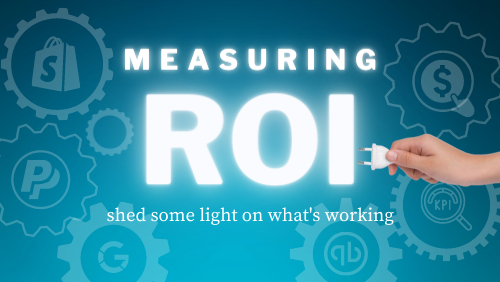One of the biggest misconceptions that we see in marketing today is entrepreneurs bragging about their revenues without any context. The problem with that is that it doesn’t provide any context into the expenses they’ve incurred in order to attain that level of income. It’s not unheard of to have a business owner rave about being a 7-figure business owner and neglect to mention that they spend over $700,000/year on digital ads.
We find that this erodes the confidence in other business owners who are actually more financially successful. They are being duped by these celebrity entrepreneur claims who use this as a misguided form of social proof.
Since we’re data nerds and seekers of truth, we don’t fall prey to these unsubstantiated revenue claims without seeing what’s actually happening behind the scenes. At the end of the day, the true metric to monitor is your marketing ROI because it gives you more information about how profitable your business is.
Marketing ROI is one of the most important metrics that businesses track because it actually begins to tell you a story about your data. It’s important to avoid being distracted by return on ad spending (ROAS) in isolation and to focus on your overall marketing ROI. Marketing ROI includes all of the costs associated with marketing – not just ad spend. By measuring marketing ROI, you can determine whether your marketing efforts are profitable and make necessary adjustments.
There are a number of different ways to measure marketing ROI. One common way is to calculate the net profit of your marketing campaigns and divide it by the total cost of those campaigns (including your agency fees and/or internal marketing salaries). This will give you your marketing ROI percentage.
You can also use marketing analytics tools to help you track marketing ROI. A marketing dashboard in Google Data Studio can be customized to meet your business needs. It acts as a single point of truth so you can see the business marketing performance across all platforms in addition to other integrations with tools such as PayPal, Stripe, Shopify, Quickbooks, Google Analytics and your CRM software.
The custom marketing dashboard can also be used to track all metrics that matter to your business, such as:
- Acquisition and engagement rates for each campaign and post
- The return on ad spend (ROAS) for each individual campaign and post
- Return on investment (ROI) for each individual campaign and post
- Conversion rates, cost per click (CPC), cost per acquisition (CPA), cost per lead (CPL) and cost per purchase for every source of new customers
- Social engagement metrics on all social media platforms
- Return on budget analysis to allow you to adjust budgets for maximum ROI
- Customizable widgets that provide a quick snapshot of your marketing performance for all KPIs relevant to your business
With these insights, marketers can compare successful campaigns and posts with other efforts in order to determine what works best. Instead of continuing down the same road with blinders on, marketers will have a better understanding and useful data that shows what’s working and how they can apply those learnings to future campaigns.
Using a marketing analytics dashboard will allow you to move from a reactionary “firefighting” strategy to a proactive approach rooted in data. Are you ready to take your business to the next level with a universal analytics tool? Click here to schedule a consultation call with us today.

